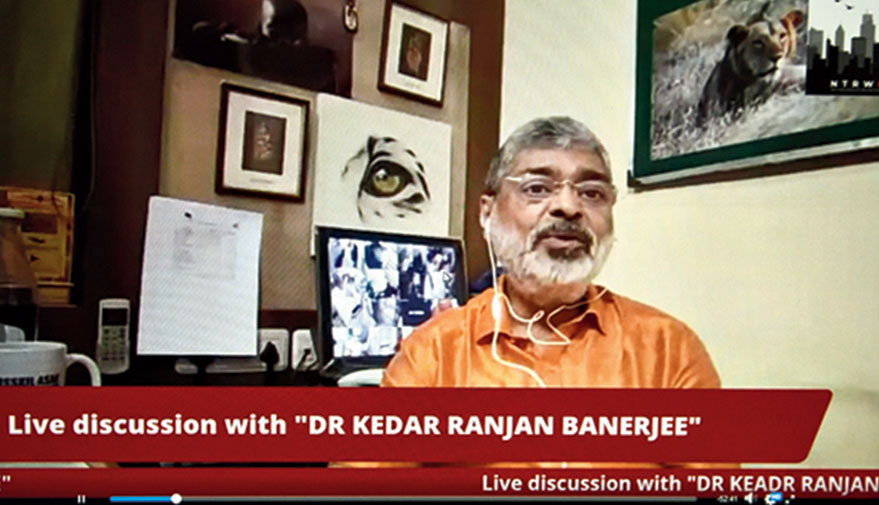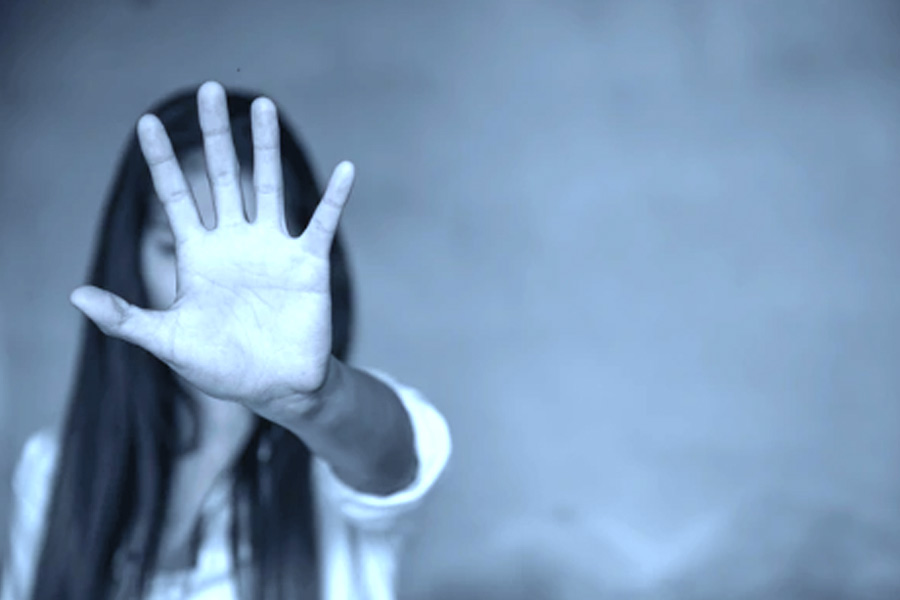How is the lockdown taking a toll on the mental health of residents? And what are the ways to identify symptoms from the behavioural patterns of family members? Psychiatrist Kedar Ranjan Banerjee addressed such issues at a recent session webcast on the social media platform of New Town Residents’ Welfare Forum. This is what he had to say —
The population today can be divided into two groups — the coronavirus affected and the unaffected. Neither group is mentally in a good state. The corona affected are small in number. The others are under pressure because of lockdown. Offices may have opened in the unlock phase but with trains and most buses not plying normally, we have to remember that we are still under lockdown.
Of those who are mentally affected, about 20 to 30 per cent are suffering from depression. That is the tip of the iceberg. If we do a survey on 100 random people with a questionnaire, we will see that 60 to 70 per cent are suffering from anxiety.
Of course, depression existed even before this novel coronavirus came. But this is acting as a major trigger.
Depression can be of two kinds —primary and secondary.
If someone falls ill during an examination and fails, he would get depressed. But that is depression for a definite cause. That is called secondary depression.
But if a working professional, with family, starts feeling blue when he likes nothing, does not feel like doing anything or going out, feels like crying, those are cases of primary depression.
Most coronavirus-related depressions are secondary, triggered by the lockdown or the constant worry about people getting infected. But primary depression, which was suppressed all this while, is also surfacing in many during this period.
Spot the symptoms
One has to be on the lookout for symptoms. Sleep disorder is one. Waking up very early, like at 2.30am or 3am, and not being able to sleep again, loss of interest, becoming irritable and losing one’s temper at the drop of a hat are some of the common manifestations. Depressed people also develop problems of cognition. They become indecisive. They also report diminishing energy levels, even refusing to get out of bed.
However, depression does not happen overnight. If family members and friends are aware, they can notice the symptoms early and seek professional help. Anti-depressants work wonderfully and a patient can make recovery in two to four weeks.
One question we get asked a lot is if the medicines we are prescribing are sleeping pills. Medical science has progressed a lot and these days, we allow patients to even drive.
What has to be overcome is the stigma. To many, a psychiatrist is still pagoler doctor. I have had even educated friends asking me to visit them at home to check on their child or some family member as they are wary of being seen in a psychiatrist’s chamber.
We do a psychometry test to see if a person is suffering only from depression or if there is something more to it.
Depression can be in four stages — mild, moderate, severe and major. Mild or moderate depression can be managed with counselling. For more serious stages, we reduce the severity with anti-depressants first. If a person is in such a state that he is not getting up from bed or even refusing to take water, there is no point counselling him then.
Emotional manifestations of depression and anxiety occur due to reduced serotonin levels in the brain which need medication to be raised.
There can be another type of depression — bipolar affective disorder. Such people alternate between two extreme states. They can experience elevated moods when they eat a lot or talk a lot. If they are asked to buy half dozen eggs from the market they end up buying two dozen. If the cost of something comes to Rs 12, they give away Rs 20. At other times, they withdraw into a shell.
Like in case of a cancer patient, counselling will not work for a depressed person who has been diagnosed with Covid-19.
But those who are not infected can be taken to be suffering from secondary depression. Counselling mostly works with them, though sometimes they too need anti-depressants.
How to avoid anxiety
Lifestyle changes: Exercise. If there is no space in your apartment, go up to the roof or the driveway downstairs. Coronavirus is not roaming in the streets, waiting to catch you. You can easily do free hand exercises in the park, keeping distance from everyone else. That will improve your night’s sleep.
Social media: Avoid Facebook, WhatsApp and all such social media. They are teeming with fake news and alarmist views on coronavirus.
TV: Stay away from news channels round the clock. If you have to watch news, do so at a fixed hour. We are getting children who say they are scared of the TV set, which must be because of what they hear as the news is kept on all day. Feel free to watch other programmes.
Focus on positives: Lockdown has given us a lot. We are bonding with family members. Communication keeps the blues at bay. Pick up the phone to speak to people. You will end up renewing ties with many you have lost touch with. Communication will lighten the mood.
Food: Eat on time and eat healthy food.
A word on children
Even if offices are open, the children are still at home. They have to be told that it is not vacation. There is a problem around which is why they are not being allowed outside. They should be made to follow the same routine as they do when school is open. Of course, play time is more now but they must study when it is time to study. We are getting children too who are coming with depression.
Depression or anxiety
The symptoms of the two may be similar but there are some differences which can be marked. Sleep comes quickly in case of depression while in anxiety, one finds it hard to fall asleep. Irritability is there in both states. But in depression, one lacks motivation and finds little interest in anything. In anxiety, there is an unknown fear that clouds the mind — what if my 88-year-old aunt gets corona?
Sometimes there is a mixed anxiety with depression, in which both symptoms are manifest.
A new disorder
Washing of hands, a vital step to stay safe from Covid-19, is emerging as a major mental problem worldwide. Research papers are being written on the subject. The problem is obsessive compulsive disorder. Such a person washes his hands but feels the hands did not clean yet. So he feels a discomfort till he can wash the hands again. When he gets to place his hands under the running tap again, he feels exhilarated.
Case for common sense
Stay safe but apply your common sense. Many are indulging in excesses.
Masks: I have seen people keeping masks on in strange situations. A couple by themselves watching TV at home. Or a person at the wheel, with the windows panes up, the air-conditioner on, and no one else in the car. Or someone working alone in his cubicle in office. Ask yourself if it is necessary to keep the mask on in such circumstances!
Gloves: The other day, an elderly man came to my chamber with woollen gloves on. I pointed that out to his grandson. He said that he had insisted on wearing those. People are going around wearing even riding gloves or cloth gloves!
One has to remember that the gloves need to be of a material that can arrest the virus and can be sanitised. Wear gloves only if you are coming in contact with risky surfaces or people outside. But even the gloves need to be sanitised at regular intervals.
The thumb rule is not to touch your face, even if your hands are gloved. You also need to ask yourself if it is easier to sterilise your hands rather than your gloves.
Summing up
The lockdown will not stay forever but fear of corona will. Treat the world as if everyone is a Covid-19 patient except you. So it is your responsibility to deal carefully with others. Be it your friends, colleagues or family members, you have to keep yourself safe from them. If we are all careful, there is no need to fear coronavirus.
Also remember, if a neighbour gets infected, do not treat him as a leper. Even if he stays next door or on a different floor in your building, the virus is not going to come out and knock on your door as long as he is staying indoors. There is no harm in calling him up to ask how he is doing and offer help with supplies. Those who misbehave with patients or medical workers who are residents of the neighbourhood have the biggest mental diseases.











